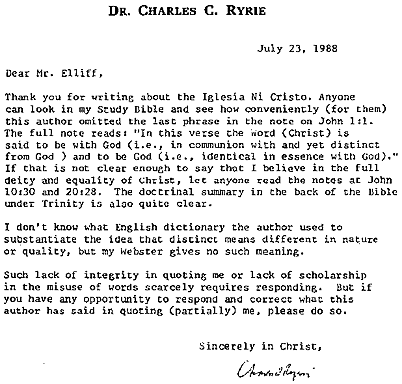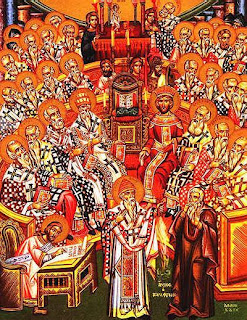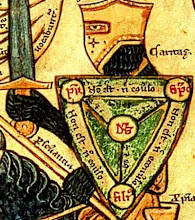Our Mission
In view of our COMMITMENT “in [our] hearts [to] revere Christ as Lord,” we seek to raise the
COMPETENCE of Christ Followers so that they would “contend for the faith that was once for all entrusted to God’s holy
people” and they would “always be
prepared to give an answer to everyone who asks [them] to give the reason for
the hope that [they] have” with all COMPASSION, that is, “with gentleness and respect.” (1 Pet.
3:15; Jude 3, NIV)
Our Strategy
“But avoid foolish and
ignorant disputes, knowing that they generate strife. And a servant of the Lord
must not quarrel but be gentle to all, able to teach, patient, in humility
correcting those who are in opposition, if God perhaps will grant them
repentance, so that they may know the truth, and that they may come to their
senses and escape the snare of the devil, having been taken captive by him to
do his will.” (NKJV)
Refrain from a
combative stance. In
discussions with people with opposing beliefs, keep in mind that “a servant of the Lord must not quarrel but
be gentle to all… [and] patient” (2 Tim 2:24). Remember that “a man
convinced against his will is of the same opinion still.” The approach is
as important as the arguments. In
the online forums, there will always bean attempt to provoke through insults or
name-calling. Never go down to
that level. Even if one may not
win the cult member, he can win the hearts of the people who are listening in
the discussion. People tend to
listen more when engaged “in humility”
(v. 25) for those who come across as proud turns them off. Someone wrote, “You can always tell who is losing an
argument by checking out who is yelling the loudest.” The Filipino saying
applies here: “Ang pikon talo.” (“He
who loses his patience loses it.”)
Equip the
saints. Now more than ever
there is a need to train and retrain pastors and church leaders and workers on
what and why they believe so that they would be “able to teach” (v. 24).
Then, they can equip their members “so
that they may know the truth” (v. 25). According to a recent study, “16% churches without pastors plus 39% churches with untrained pastors
translates into a need to train pastors for 55% of the churches in the
Philippines.” In fact, it can even go as high as 63%. There is a need to
equip the church so that they “should no
longer be children, tossed to and fro and carried about with every wind of
doctrine” (Eph 4:12-16. See also Titus 1:9-11). It is important to train the
equippers to communicate the Word in a way that is simple, practical and
authoritative.
Always show
interest for the person. Avoid
personal attacks or ad hominem arguments.
They are not the enemies.
Satan deceived them, “having been
taken captive by him to do his will” (2 Tim 2:26c). Thus, they need to “escape the snare of the devil” (v. 26b). Engage in a respectful way. In doing so, one earns the right to be heard. Ask the person why he got converted to
the group. He could have joined
the group for reasons other than spiritual hunger. If the person joined the group out of a social need, then
befriend him. Keep in mind that “people do not care how much we know unless
they know how much we care.”
Concentrate on
major issues. Discuss only the
essentials of the faith with those with opposing beliefs and avoid “foolish and stupid arguments, because you
know they produce quarrels” (v. 24, NIV). Move away from minor issues like tithing or eating blood. Even equally competent Bible scholars
disagree on these matters. Focus
on fundamentals topics such as the deity and humanity of Christ. Keep the discussion on track by
summarizing the points already discussed.
In discussions, the cultists tend to veer away and jump from one topic
to another. So pull them back to
the original topic.
Help them to
think. In “correcting those who are in opposition… [the goal is] that they may
come to their senses” (v. 25).
If they misquote a verse, show them its context. Explain how to arrive at its proper
interpretation. Do not pit one verse against another. This would appear to be dodging the issue. Challenge them to think for themselves
and not just accept blindly everything that their religious group teaches them.
Our Statement of Faith
We accept those essential doctrinal teachings on which, historically, there has been general agreement among all true
Christians. We desire to allow for freedom of conviction on other non-essential doctrinal
matters, provided that any interpretation is based upon the Bible alone, and
that no such interpretation shall become an issue that hinders the ministry to
which God has called us.
We explicitly affirm our belief in the teachings of
Scriptures:
ABOUT GOD
There is one true God, eternally existing in three persons
Father, Son, and Holy Spirit each of whom possesses equally all the attributes
of deity and the characteristics of personality. Deut. 6:4; Matt. 28:18-20; John 1:1-3; Acts 5:3,4.
ABOUT JESUS CHRIST
Jesus Christ is God, the living Word, who became flesh
through His miraculous conception by the Holy Spirit and His virgin birth.
Hence, He is the perfect deity and true humanity united in one person
forever. John 1:1,14; Matt.
1:18-25; Luke 1:30-37; Col. 2:9; Phil. 2:6-11.
He lived a sinless life and voluntarily atoned for the sins
of men by dying on the cross as their substitute, thus satisfying divine
justice and accomplishing salvation for all who trust in Him alone. 1 John 3:5;
1 Peter 3:18; John 10:17-18; 2 Cor. 5:21; 1 John 4:10; Romans 3:24-26.
He rose from the dead in the same body, though glorified, in
which He had lived and died. 1 Cor. 15:4,14,20; Luke 24:36-43; John 20:24-29.
He ascended bodily into heaven and sat down at the right
hand of God the Father where He, the only mediator between God and man,
continually makes intercession for His own. Acts 1:9-11; Eph. 1:20; 1 Tim. 2:5;
Heb. 7:24,25; 1 John 2:1,2.
ABOUT THE HOLY SPIRIT
The Holy Spirit has come into the world to reveal and
glorify Christ and to apply the saving work of Christ to men. He convicts and
draws sinners to Christ, imparts new life to them, continually indwells them
from the moment of spiritual birth, and seals them until the day of redemption.
His fullness, power, and control are appropriated in the believer's life by
faith. John 3:5-8; 16:7-15; Titus
3:5; Rom. 8:2-4,9; Eph. 1:13-14; 4:30; 1 Cor. 6:19.
ABOUT THE BIBLE
The sole basis of our beliefs is the Bible, God's infallible
written word, the sixty-six books of the Old and New Testament. We believe that
it was uniquely, verbally, and fully inspired by the Holy Spirit, and that it
was written without error (inerrant) in the original manuscripts. It is the
supreme and final authority in all matters on which it speaks. 2 Timothy 3:16;
2 Peter 1:20, 21; 2 Timothy 1:13; Psalm 119:105,160, 12:6; Proverbs 30:5
ABOUT HUMAN BEINGS
Man was originally created in the image of God. He sinned by
disobeying God; thus, he was alienated from his Creator. That historic fall
brought all mankind under divine condemnation. Gen. 1:26-27; 2:15-17; 3:1-24;
Rom. 5:12-21; 1 Cor. 15:21-22.
Man's nature is corrupted, and he is thus totally unable to
please God. Every man is in need of regeneration and renewal of the Holy Spirit.
Rom. 3:9-20; Eph. 2:1-7; Mark 7:20-23; John 3:1-21; Titus 3:5-7.
ABOUT SALVATION
The salvation of man is wholly a work of God's free grace
and is not the work, in whole or in part, of human works or goodness or
religious ceremony. God imputes His righteousness to those who put their faith
in Christ alone for their salvation, and thereby justifies them in His sight. Eph.
2:8-10; Rom. 3:21-26; 9:30-33; Gal. 3:11-14, 22-24.
It is the privilege of all who are born again of the Spirit
to be assured of their salvation from the very moment they trust Christ as
their Savior. This assurance is not based upon any kind of human merit, but is
produced by the witness of the Holy Spirit, who confirms in the believer the
testimony of God in His written Word. 1 Thess. 1:5; John 1:12,13; Rom. 8:14-17.
Every believer is called to so live in the power and control
of the indwelling Spirit that he will not fulfill the lust of the flesh but
will bear fruit to the glory of God. Gal. 5:16-25; Eph. 5:18.
ABOUT THE CHURCH
Jesus Christ is the Head of the Church, His body, which is
composed of all men, living and dead, who have been joined to Him through
saving faith. Col. 1:18; Eph. 1:22-23; 5:23-32; 1 Thess. 4:13-18.
God admonishes His people to assemble together regularly for
worship, for participation in the ordinances, for edification through the
Scriptures, and for mutual encouragement. Heb. 10:23-25; Acts 2:41-42; 20:7;
Eph. 4:11-16; 1 Tim. 4:13; 2 Tim. 3:16-4:2.
The Lord Jesus Christ commanded all believers to proclaim
the gospel throughout the world and to disciple men of every nation. The
fulfillment of the Great Commission requires that all worldly and personal
ambitions be subordinated to a total commitment to Him who loved us and gave Himself
for us. Matt. 28:18-20; Mark 16:15-16; Luke 24:46-49; Acts 1:7-8; Rom. 12:1-2;
Gal. 2:19-20; Phil. 3:7-21.
ABOUT ETERNITY
At physical death the believer enters immediately into
eternal, conscious fellowship with the Lord and awaits resurrection of his body
to everlasting glory and blessing. 2 Cor. 5:8; Phil. 1:23-24; 3:20-21; Luke
23:39-43; 1 Cor. 15:12-58; 1 Thess. 4:13-18; 1 John 3:2.
At physical death the unbeliever enters immediately into
eternal, conscious separation from the Lord and awaits resurrection of his body
to everlasting judgment and condemnation. Luke 16:19-31; John 5:23-29; Rev.
20:10-15; Matt. 13:40-43.
ABOUT THE LAST DAYS
Jesus Christ will come again to the earth–personally,
visibly, and bodily–to consummate history and the eternal plan of God. Acts
1:9-11; 3:19-21; Matt. 24:44; Rev. 19-22.
© 2012 Bible Exposé Apologetics Ministry




